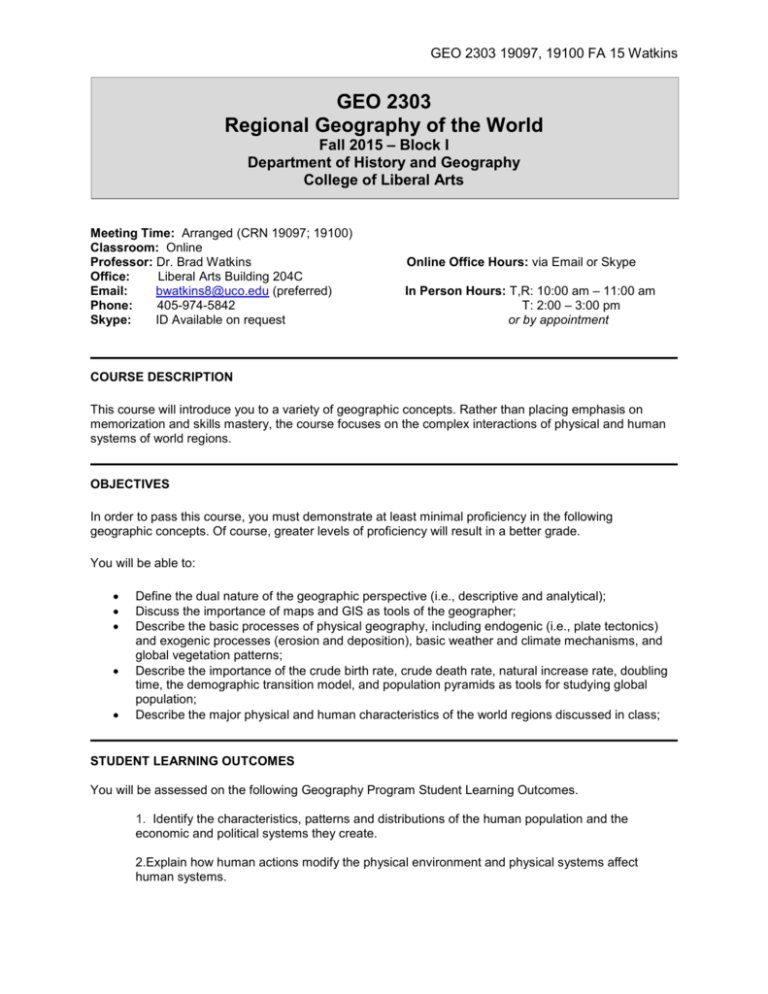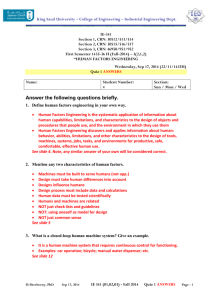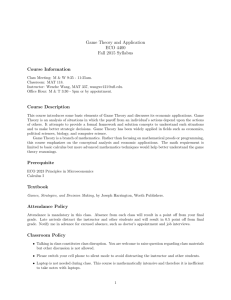GEO 2303 Regional Geography of the World
advertisement

GEO 2303 19097, 19100 FA 15 Watkins GEO 2303 Regional Geography of the World Fall 2015 – Block I Department of History and Geography College of Liberal Arts Meeting Time: Arranged (CRN 19097; 19100) Classroom: Online Professor: Dr. Brad Watkins Office: Liberal Arts Building 204C Email: bwatkins8@uco.edu (preferred) Phone: 405-974-5842 Skype: ID Available on request Online Office Hours: via Email or Skype In Person Hours: T,R: 10:00 am – 11:00 am T: 2:00 – 3:00 pm or by appointment COURSE DESCRIPTION This course will introduce you to a variety of geographic concepts. Rather than placing emphasis on memorization and skills mastery, the course focuses on the complex interactions of physical and human systems of world regions. OBJECTIVES In order to pass this course, you must demonstrate at least minimal proficiency in the following geographic concepts. Of course, greater levels of proficiency will result in a better grade. You will be able to: Define the dual nature of the geographic perspective (i.e., descriptive and analytical); Discuss the importance of maps and GIS as tools of the geographer; Describe the basic processes of physical geography, including endogenic (i.e., plate tectonics) and exogenic processes (erosion and deposition), basic weather and climate mechanisms, and global vegetation patterns; Describe the importance of the crude birth rate, crude death rate, natural increase rate, doubling time, the demographic transition model, and population pyramids as tools for studying global population; Describe the major physical and human characteristics of the world regions discussed in class; STUDENT LEARNING OUTCOMES You will be assessed on the following Geography Program Student Learning Outcomes. 1. Identify the characteristics, patterns and distributions of the human population and the economic and political systems they create. 2.Explain how human actions modify the physical environment and physical systems affect human systems. GEO 2303 FA 2015 Online 3. Acquire awareness of the diversity of peoples, places, and environments within a specific region or around the world. TRANSFORMATIONAL LEARNING OBJECTIVES At the University of Central Oklahoma, we are guided by the mission of helping students learn by providing transformative experiences so that they may become productive, creative, ethical and engaged citizens and leaders contributing to the intellectual, cultural, economic and social advancement of the communities they serve. Transformative learning is a holistic process that places students at the center of their own active and reflective learning experiences. A student’s major field is central to the learning experience and is a vital part of the “Central Six.” This course addresses two of the university’s transformative learning goals. Discipline Knowledge Students survey the world’s regions using principles of physical and cultural geography as a framework with a focus on interrelationships among regions. Global and Cultural Competencies Students engage in discussions that require multiple perspectives and cultural understanding and sensitivity while acknowledging the differences/similarities among the world’s regions. ONLINE ETIQUETTE Please respect the online learning environment of students and the professor. I encourage lively exchanges in Discussion posts, but derogatory comments, negativity, and poor attitudes will not be tolerated and will be considered disruptive behavior. If you engage in these disruptive activities you will be warned. If you commit multiple violations of the state policy disciplinary action will be considered as outlined in the Code of Student Conduct. LATE WORK AND MAKE-UP QUIZZES Quizzes may not be made up. I will not accept late assignments. Desire2Learn It is your responsibility to check Desire2Learn frequently for announcements, learning modules, study guides, and assessments. Content topics will be released Mondays at 9:00 am. Discussions, Journal Posts, and Map Quizzes will be due Mondays (following the day they are assigned) at 9:00 am. REQUIRED BOOK Diversity Amid Globalization: World Regions, Environment, Development by Les Rowntree, Martin Lewis, Marie Price, and William Wyckoff. 6th Edition, 2015 RECOMMENDED MATERIALS Webcam for Skype. This is NOT required. Some students prefer to see the professor during meetings. I’ll leave it up to you. 2 GEO 2303 FA 2015 Online COURSE REQUIREMENTS Textbook Readings It is your responsibility to complete the required reading assignment for each week as listed on the last page of the syllabus. Content Topics It is your responsibility to go through each content topic in Desire2Learn and complete the readings in each. You are required to complete outside readings linked to certain topics. Required discussion posts are listed at the beginning of certain topics. Map Quizzes You will have twelve map quizzes this semester—one for each region. The first map quiz will be delivered during Week 3, when we begin our first region. You need to study the physical/political map at the beginning of each chapter. I provide a map quiz list within each week’s module to help you focus your study. Use the lists to identify the features for each region. You will have 8 minutes to complete each 20 question map quiz. Journal Entries There are required journal entries in the course. Writing is an important component in University Core courses, so you are required to complete a well-written, properly cited, on topic assignment. Cite sources using the Chicago Manual of Style, author-date format with parenthetical citations. Journal Entry: You post your answer to the question for that week that only the instructor will read. You will not reply to another students post (since you cannot read them). Source materials used in Journal entries must be fully cited. Chapter Reflections You will reflect on each week’s topics covered in the modules and textbook. Reflections will be assessed based on the student’s demonstration of understanding the concepts (topics, etc) and applying that information to their own personal and professional development. You may reflect on a particular topic anytime by clicking on the “Reflect in ePortfolio” button at the bottom of the slide. Reflections entered this way will be tagged to the module in which they were opened. You will submit your reflections in Dropbox. When you open the Dropbox, click “Add a File”, then select “ePortfolio” from the choices on the left. These reflections will be collected and submitted via Dropbox twice during the course. Students will be required to submit their reflections as a presentation through ePortfolio. In the presentation, students must select 2 reflections and analyze the reflections to determine if additional growth has occurred (or change in thought) since writing the original reflection. Students must state why growth did or did not occur. Finally, students should review all reflections and provide a cumulative reflection (Blooms’ synthesis) on overall growth (views, etc) in the course and how the course might impact their future personal or professional self. There are no exams in this course. 3 GEO 2303 FA 2015 Online GRADE SCALE Assessment Map Quizzes (12) Journals (4) Reflections (2) Reflection Portfolio (1) Participation Total Points A 1000-900 B 899-800 C 799-700 D 699-600 Points Each 30 100 50 100 Points 360 400 100 100 40 1,000 F < 600 ACCOMODATIONS ADA Statement: The University of Central Oklahoma complies with Section 504 of the Rehabilitation Act of 1973 and the Americans with Disabilities Act. Students with disabilities who need special accommodations should make their request by contacting Disability Support Services at 974-2549. SYLLABUS ATTACHMENT http://www.uco.edu/academic-affairs/files/aa-forms/StudentInfoSheet.pdf 4 GEO 2303 FA 2015 Online COURSE OUTLINE Week (Starting Day*) Topic Reading Assignment 1 (Aug 17) Orientation Module Module 1: Concepts of World Geography Ch 1 2 (Aug 24) Module 2: The Changing Global Environment Module 3: North America Ch 2 Ch 3 3 (Aug 31) Module 4: Latin America Module 5: The Caribbean Ch 4 Ch 5 4 (Sep 7) Module 6: Sub-Saharan Africa Module 7: Southwest Asia and North Africa Ch 6 Ch 7 5 (Sep 14) Module 8: Europe Module 9: The Russian Domain Ch 8 Ch 9 6 (Sep 21) Module 10: Central Asia Module 11: East Asia Ch 10 Ch 11 7 (Sep 28) Module 12: South Asia Module 13: Southeast Asia Module 14: Australia and Oceania Ch 12 Ch 13 Ch 14 8 (Oct 5) Course ends October 6th * Modules will be released Mondays at 9:00 am and close the following Monday at 9:00 am. 5 GEO 2303 FA 2015 Online ASSIGNMENT DUE DATES Week (Starting Day*) Assignment Due 1 (Aug 17) Syllabus Quiz Aug 24 2 (Aug 24) Map Quiz 1: North America Aug 31 3 (Aug 31) Module 4 Journal: Tropical Deforestation Map Quiz 2: Latin America Map Quiz 3: The Caribbean 4 (Sep 7) Module 7 Journal: Southwest Asia and North Africa Map Quiz 4: Sub-Saharan Africa Map Quiz 5: Southwest Asia and North Africa Course Reflection I Sep 14 Sep 14 Sep 14 Sep 14 5 (Sep 14) Map Quiz 6: Europe Map Quiz 7: The Russian Domain Sep 21 Sep 21 6 (Sep 21) Module 10 Journal: The Aral Sea Map Quiz 8: Central Asia Map Quiz 9: East Asia Sep 28 Sep 28 Sep 28 7 (Sep 28) Module 12 Journal: India: World’s Most Populous Country? Map Quiz 10: South Asia Map Quiz 11: Southeast Asia Course Reflection II Oct 5 Oct 5 Oct 5 Oct 5 8 (Oct 5) Map Quiz 12: Australia and Oceania Course Reflection ePortfolio Oct 7 Oct 7 Sep 7 Sep 7 Sep 7 *All assignments will be posted Mondays at 9:00 am and be due the following Monday at 9:00 am, except for the last map quiz and course reflection, which are due the last day of class. 6



